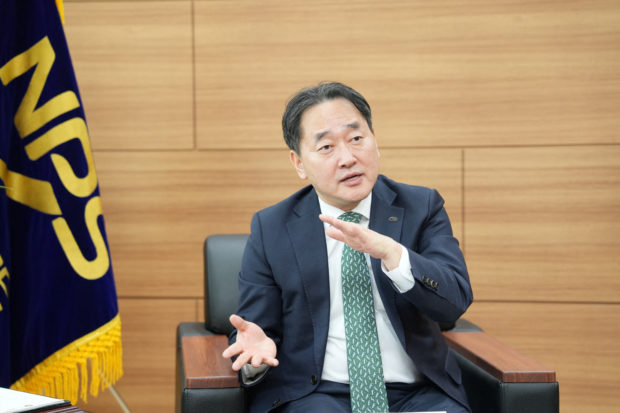
Kim Tae-hyun, Chairman & CEO of South Korea’s National Pension Service, speaks during an interview with Reuters in Seoul, South Korea, March 3, 2023. National Pension Service/Handout via REUTERS
SEOUL – South Korea’s National Pension Service (NPS), manager of the world’s third-largest public pension fund, will collaborate with foreign exchange authorities when needed to help stabilize the market, its chairman told Reuters.
Chairman Kim Tae-hyun also said during an interview on Friday with Reuters that re-establishing a currency swap arrangement with South Korea’s central bank which expired at the end of last year could be part of such collaboration.
NPS has nearly $700 billion under its management and needs to buy dollars to invest abroad. That sometimes brings criticism for aggravating the situation when a sharp decline in the won causes tension in the market.
“Based on last year’s experience, we have prepared measures aimed at easing dollar demand and volatility in the foreign exchange market,” Kim said.
The pension fund will cooperate with foreign exchange authorities to deploy the measures in case of excessive volatility, acting according to prearranged plans when the dollar/won exchange rate reaches certain levels, he said.
“We have our own target rate for foreign exchange that we can endure,” Kim said.
“A predictable and stable foreign exchange rate is also advantageous to us,” he said, adding that cooperation with foreign exchange authorities would be based on achieving good investment returns.
Regarding the possible re-launch of the foreign exchange swap arrangement with the Bank of Korea, Kim said it would be “definitely necessary to stabilize the market”, without elaborating.
The swap program, in place for the final three months of last year, allowed the pension fund to use the central bank’s foreign reserves for overseas investments when there was increased volatility in the foreign exchange market.
The won in February suffered its worst monthly loss in more than 11 years, weakening by nearly 7 percent against the dollar and again sparking concerns in the onshore currency market over the demand for dollars outpacing supply.
Kim said the fund was enjoying improved investment earnings of around 5 percent so far this year, after scoring a record 8.22 percent loss for the whole of 2022. The fund would continue to increase investment in overseas assets and other alternatives for better returns, he said.
Kim said he plans to simplify processes for alternative investments and devise a new strategy that allows more flexible management while strengthening partnerships with offshore outsourcing firms.
Despite criticism that the relocation of its headquarters to Jeonju, 200 km (125 miles) south of the capital Seoul, has caused difficulties in hiring strong employees and securing resources, Kim said he hopes to attract more investment and offshore-directed companies to set up liaison offices in the city and transform it into an “information hub”.
With the fund expected to be depleted by 2055, his top priority is to provide support for the government’s plan to reform the national pension system, he said.
This was Kim’s first exclusive interview with any media outlet since his three-year term began last September.

